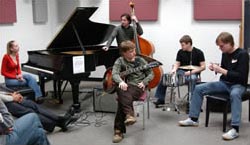|
If it’s Tuesday, this must be Louisville
 University of Louisville (Louisville, KY)
University of Louisville (Louisville, KY)
Posted on February 23, 2006
By Kevin Rayburn
 |
| The Open World Quintet: Natalya Smirnova, piano; Robert Pilyakalnis, bass; Maksim Belitskiy, guitar; Andrey Ivanov, drums; and Maksim Nekrasov, harmonica. | With an itinerary that rivals the most intensive world tour, five Russian jazz musicians have come to the United States for 15 days to play and hear jazz in the land that gave birth to the music they love.
While here, the musicians will perform concerts, participate in jazz master classes and partake of local cultural activities.
Their trip is sponsored by the federal cultural-exchange program Open World. This is the second time the University of Louisville has been a program host, said jazz studies director Mike Tracy, who coordinated both visits.
Only four days in, at least one musician already showed the strain of a schedule that included more than 100 events.
“I am tired from so much conversation,” said Maksim Nekrasov, a harmonica player from St. Petersburg — but not so tired that he couldn’t talk often and enthusiastically when the subject turned to jazz and the music scene in Russia.
Nekrasov played a key role in organizing the Russian contingent. He urged colleagues in the St. Petersburg Jazz Philharmonic to join the Open World ensemble. They are drummer Andrey Ivanov, guitarist Maksim Belitskiy and bassist Robert Pilyakalnis. Pianist and singer Natalya Smirnova is from Moscow.
One of the goals of the Open World program is to forge a better understanding between the United States and Russia.
“I’ve had students here ask me, ‘There’s jazz in Russia?’ Well, yes, and a lot of their young musicians play as well as our students,” Tracy said. “They really are laying to rest the old ideas from my generation about Russians. Like us, they just want to play music and enjoy life. This is a unique opportunity for our faculty and students to share the experience of music with them.”
Although this is their first visit to Louisville, Pilyakalnis said he was excited about visiting, having heard of the city early in his education.
“I was familiar with the play-along music teaching materials put out by (U of L jazz instructor) Jamey Aebersold,” he said. “I’m looking forward to seeing as many concerts here as possible, and also visiting some music stores and some of the large sports shops.”
Early in their trip, the group sat in with Louisville vibraphonist Dick Sisto during an engagement at the Seelbach Hotel bar. They also performed a concert as part of Jazz Week at the School of Music, which coincides with their visit.
“I’m learning a lot from listening to the musicians here,” Nekrasov said, adding that he especially admired the playing of Jazz Week visiting educator, pianist Harry Pickens. “I very much like the high quality of his playing, the maturity, shape and form of his solo.”
For all the differences between Russia and the United States, there are similarities. The musicians said they’re finding out that musicians in both countries earn their livings in much the same way.
“Everyone in this group survives by playing jazz in Russia,” said Misha Feigin, the ensemble’s translator. “They play in concert halls, in small jazz cafes, in restaurants and at weddings. Some of them, like Maksim Nekrasov, also play in rock bands. Each one of them belongs to three or four different groups at any given time.”
Getting work as a jazz musician in Russia is easier than it used to be.
“Maybe 10 years or so ago there were times when you couldn’t get a job, but that’s changed,” Nekrasov said. “People there appreciate jazz more today because it’s on the radio and people want it for background music at special events.”
Much of what jazz musicians learn comes from self-teaching — such as listening to often-pirated American jazz recordings. Still, said Nekrasov, jazz education has improved:
“The level of quality of jazz education is not as high in Russia, but it is getting better. I think as audiences understand the music better the teaching will improve, too.”
But the feeling a musician gets from playing jazz doesn’t have to be taught.
“When I play a good concert, I feel elated,” Nekrasov said. “When it doesn’t go well, I feel shame.”
“To play jazz is to swing,” Pilyakalnis said. “In other musical styles it is impossible to feel that way.”
[Reprinted with Permission]
All Press Articles
|













